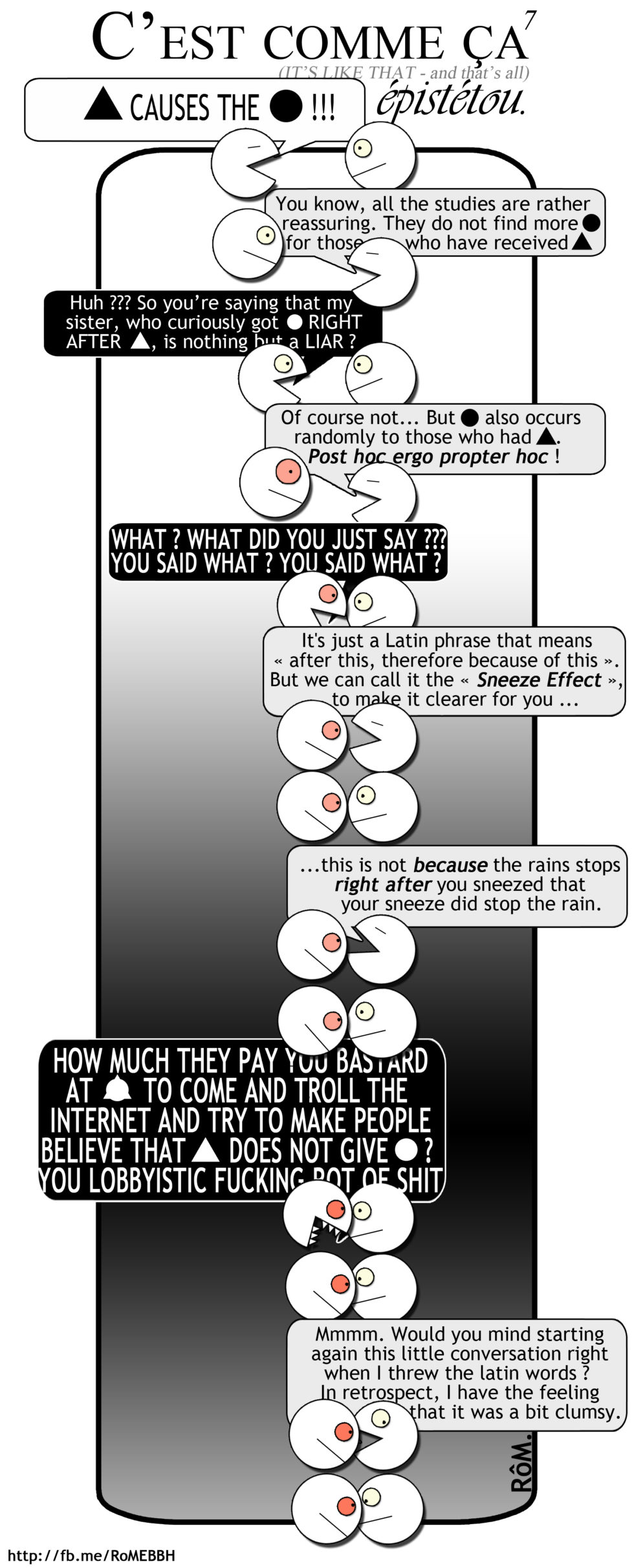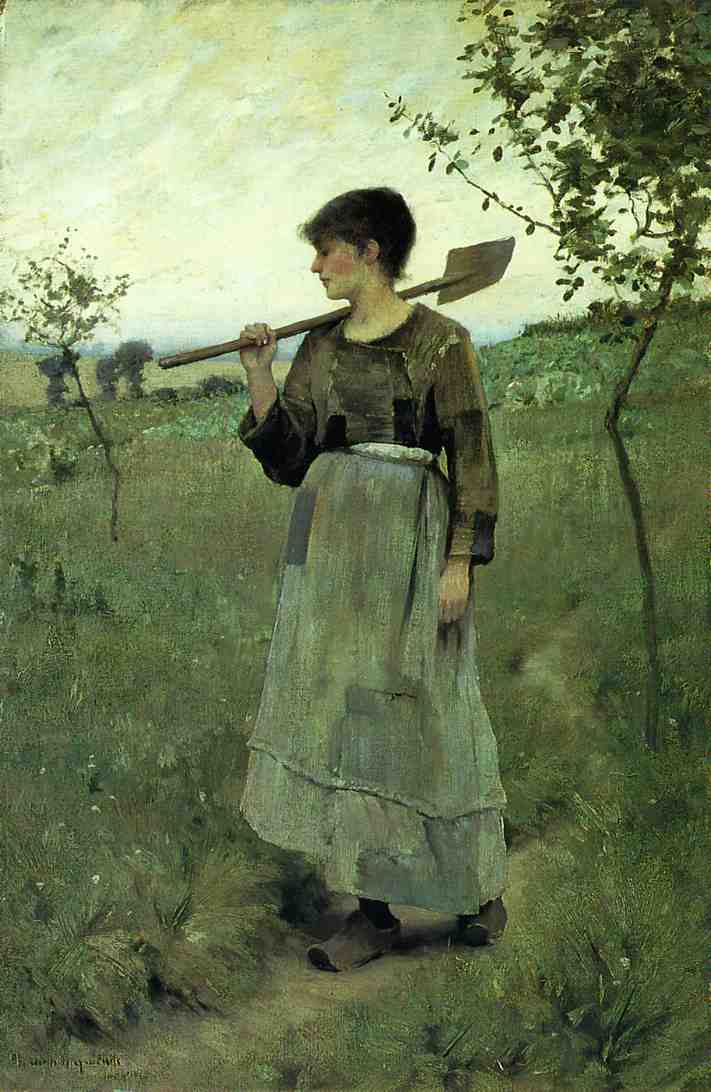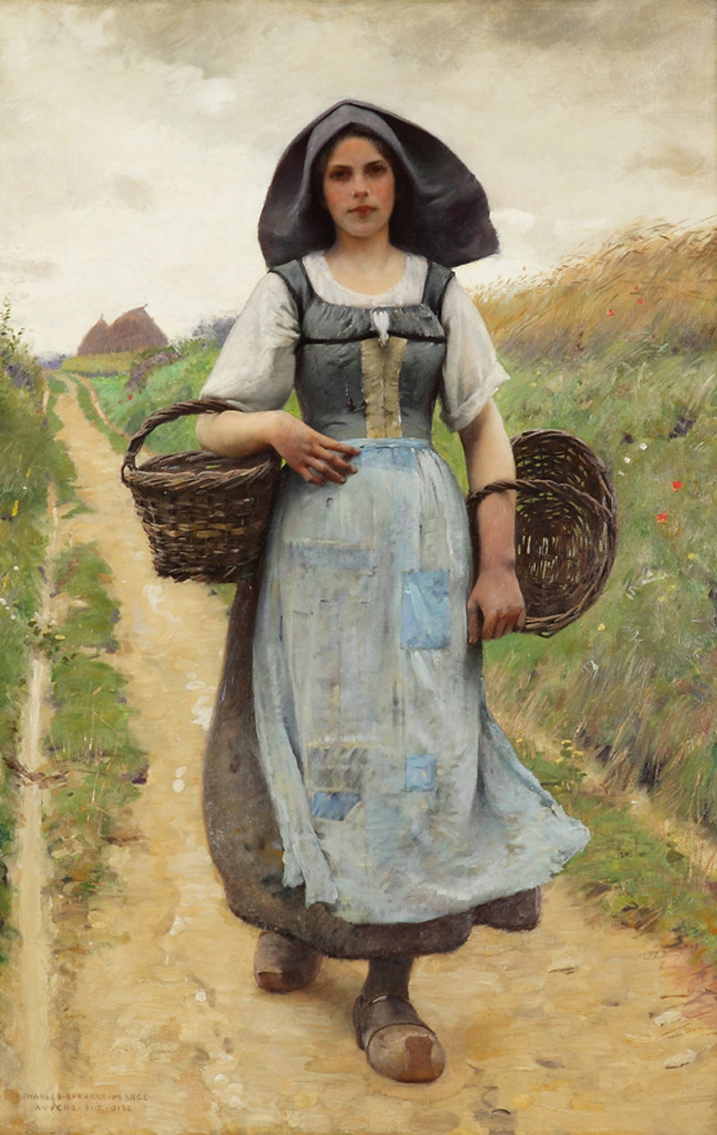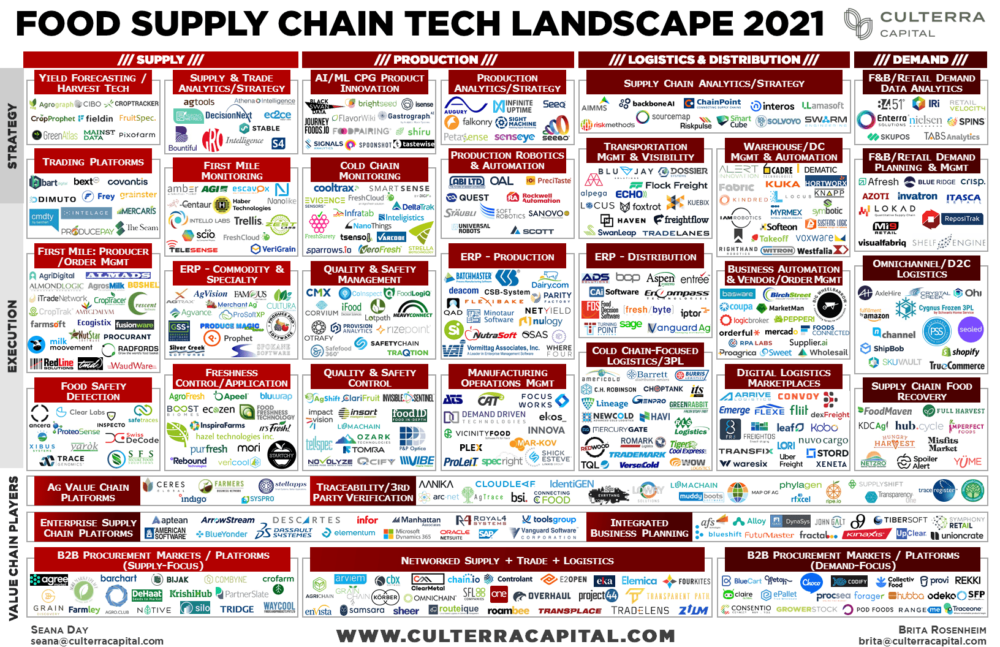|
You
can also view the message online
|
||||||||||||||||||||
 Châtenay-Malabry (FR - 92290), 28 December, 2020 EFITA newsletter / 965 - European Federation for Information Technology in Agriculture, Food and the Environment Do not miss the Virus Jokes in English and French > Coronavirus 4 Coronavirus 3 Coronavirus 2 Ant joke Coronavirus 1 > Virus et autres sujets Virus 6 Virus 5 Virus 4 Virus 3 Virus 2 Virus 1 > Les dernières histoire de l'oncle Paul (Jamet) (mostly in French) > Les dernières histoires de Georges Larroque(mostly in French) > Les dernières histoires de Michel Gil-Antoli (mostly in French) > Les dernières histoires de Jean Pinon et Luc Becker (mostly in French) The informatique-agricole.org site now offers you the possibility of subscribing the RSS feeds of its two newsletters See RSS feeds to implement to ensure that you continue to receive this newsletter To unsubscribe this newsletter, please contact me directely: guy.waksman(a)laposte.net if this link Unsubscribe does not work. Please note that I changed the presentation of the links that are embedded in the name of the web service. 
To correspond with me (GW), please use this address: guy.waksman(a)laposte.net To subscribe the efita newsletter (please ask your friends and colleagues to test this link) Efita Newsletters subscription Weekly newsletters about ICT in Agriculture in English and French Both newsletters have around 14000 subscribers. >>> Last weekly EFITA Newsletters in English (created in 1999) Efita Newsletters >>> Last weekly AFIA Newsletters in French (created more than 20 years ago in 1997) Afia Newsletters >>> Statistics for the last efita newsletter >>> Last issue of the afia newsletter >>> Last available satistics for the afia newsletter Latin
Efita Newsletter 964, dated December 21, 2020 Not only the good info, among the old photos and the jokes, is so rich: I did see them all. Contact: Nick SIGRIMIS E-mail: ns(a)aua.gr Nicolae Grigorescu (painter) = Romania My dear friend, I am sending here a small part of our soul… I hope that you will be able to see us directly. Yours, Alex prof.dr.ing. Alexandru NAGHIU University of Agricultural Sciences Cluj-Napoca Romania E-mail : alexnaghiu11(a)yahoo.com > Politics 1 >> It is really sad to see UK leaving the EU! The EU owes to Britain at least the rule of Law, the single market, the enlargement to its nine Eastern members after 1989. All the best, our friends! Hereafter a few links about the Brexit… Splendid isolation … or just a bit-part player? Europe reacts to British ‘victory’ …/… Le Monde said the country was now facing a dilemma from over half a century ago. “The United Kingdom finds itself once again facing a question that was never resolved after 1945: its place in the world,” wrote Philippe Bernard. “Its like Back to the Future, from the 1950s. “While Germany and France launched themselves into building Europe, the British refused to join this project, too limited for their ambitions and initiated by two countries they considered, unlike themselves, losers of the war.” .../... See theguardian.com Margaret Thatcher said plan for the euro was 'a rush of blood', archives reveal The then British PM told her Irish counterpart that the bureaucracy in Brussels was a ‘politburo’ and was tying the UK up in regulations, papers show. See theguardian.com This Brexit disaster has been brewing in the Conservative party for 30 years, by John Harris See theguardian.com Farewell, Europe: the long road to Brexit See theguardian.com We want to trust in each other. But it’d be easier if we weren’t so isolated, by Kenan Malik See theguardian.com How did we the future yesterday?? See the incredible collection developed by Alain Fraval > Politics 2 >> To try to understand why D. Trump got 10 millions more votes than 4 years ago The secret to Donald Trump's electoral strategy? Emotion, not policy, by Arlie Hochschild (September 2, 2020) See theguardian.com Is Donald Trump a bully or bold protector? That depends on whom you ask, by Arlie Hochschild (October 11, 2020) See theguardian.com Sociologist Arlie Hochschild Discusses 2020 Election, with Joe Donahue (November 2, 2020) See wamc.org Nothing is more responsible for the good old days than a bad memory: Home from the Fields by Charles Sprague-Pearce Nothing is more responsible for the good old days than a bad memory: A Peasant Girl by Charles Sprague-Pearce
Multisensor drone aids researchers studying tar spot Purdue University and startup company Gryfn partner to build market-ready technology for crop researchers. See farmprogress.com Data analysis can pay off in better yields next year by P.J. Griekspoor Asgrow Dekalb agronomist explains how simple tools can help make sense of piles of data. See farmprogress.com Farmview – Premium service in Fieldclimate Farmview combines existing iMETOS® hardware and software and satellite data for better decision making. The first Farmview module ‘Irrimet’ uses a fusion of different sensing devices in your field to calculate the irrigation needs. See metos.at How to make money from carbon soil sequestration? The day is coming when most farmers in the developed world will earn money from storing carbon dioxide in their soils, but when and how much? See futurefarming.com Expert Opinion: ‘2021 will be a breakout year for women in agriculture’ Today, brains – not brawn – are the new key to a farm’s success as technology closes the gender gap. See futurefarming.com
Startup launches innovative electric tractor, by Willie Vogt The Monarch Tractor does more than replace an engine with a battery; new machine offers autonomous operation, enhanced data collection See farmprogress.com Robotic weed removal eliminates need for expensive hand crews by Todd Fitchette FarmWise offers a business model that provides weeding services, freeing the grower from having to own and maintain a machine. See farmprogress.com Nothing is more responsible for the good old days than a bad memory: A Shepherd Boy by Charles Sprague-Pearce Sprayers: John Deere to sell Smart-Apply spray control system Smart-Apply Intelligent Spray Control System is an add-on kit for towed air-blast sprayers. See futurefarming.com Field robots: New Russian agricultural robot is on track to field trials “Siberian Tiger” is designed to monitor crops and soil conditions, using a set of cameras and sensors. See futurefarming.com Field robot catalogue: World’s first robot catalogue with 35 propositions In our robot catalogue you will find 35 field and harvest robots that are available in 2021. See futurefarming.com Tencent, others plow $15m+ into ag automator FJ Dynamics China’s FJ Dynamics, which builds automation solutions for agriculture and related industries, has raised “hundreds of millions of yuan” ($15 million-plus) in funding, according to a statement posted on its WeChat feed. The Shenzhen-based startup secured the funding from crosstown tech giant Tencent along with several other undisclosed investors. It said the capital will be used to further develop and commercialize its products and core technologies. FJ Dynamics is also backed by Shenzhenite drone manufacturer DJI and state-owned automaker Dongfeng Motor. In May, it raised a ‘Series A1’ round worth 100 million ($15 million) from the government-linked, Hong Kong-based Greater Bay Area Homeland Development Fund and other investors.
Nothing is more responsible for the good old days than a bad memory: La fenaison en Auvergne ; esquisse, premier projet du tableau de 1855 de Rosa Bonheur
Delivering the goods: Food supply chain tech market map & predictions for 2021, by Seana Day & Brita Rosenheim We have been covering the foodtech and agtech sectors for the past decade, yet the Covid-19 pandemic thrust the food supply chain into the spotlight like we never could have anticipated. As we saw scores of pandemic-driven shortages on the shelf supply disruptions, and dislocations in production and distribution, we were left with a complicated question: What does it really take to get data flowing from the farm to your plate? It was that question that launched our odyssey into food supply chain tech...
Tractor Zoom scores $3m Series A to expand ‘transparent’ equipment pricing platform The Iowan startup analyzes transactions involving second-hand farm equipment to provide price transparency through real-time sales comparisons. See agfundernews.com Santa’s Naughty List 2020 Hi, I'm Amanda. My family farms corn and soybeans in Southwest Michigan. I'm an attorney and I'm passionate about agriculture! See thefarmersdaughterusa.com
Post doctoral opportunities in Brazil The Center for Artificial Intelligence (C4AI - 'Center for Artificial Intelligence'), a Research Center financed by FAPESP and IBM Research, based at the University of São Paulo, USP, is offering a significant set of postdoctoral fellowships (values in the FAPESP table). The Center conducts several projects, as indicated below: natural language processing, question/answer systems, decision making, and machine learning. In addition, the Center's research involves applications on various topics, such as health, agribusiness, environment, and public policies. Scholars will be based in one of the spaces of the Center, which brings together researchers based in various locations (for example, São Paulo capital, São Carlos, Ribeirão Preto, Piracicaba, São José dos Campos, etc.). AgriBio is the name of one of the C4AI main challenges. Agribusiness production cycles, environmental sustainability, and food security are recurring demands that defy worldwide authorities. In these settings, large-scale heterogeneous information modeling and resilient learning systems (capable of working with the dynamicity of real environments) are essential. The AgriBio Challenge focuses on investigating multi-criteria causal models based on AI for decision making under uncertainty in food production networks. In this call, the AgriBio Challenge presents a set of scholarships dedicated to Post-doc investigators. Candidates must send a message to c4ai-agribio(a)usp.br highlighting profile adequacy, motivation to lead one of the available positions, and a short CV. The deadline for submission is January 31, 2021. ==>> Information related to each scholarship project is organized into two groups, one focused on Food Security and the other on Commodities. ==>> Food Security: Post-Doc Position: Bayesian causal network on food security decision making We are in the Big Data Era when data are rapidly and continuously growing into large datasets from many heterogeneous sources. The algorithms used to extract knowledge from data should represent uncertainty, in model and data, in a reliable way. A Bayesian network (BN) is a compact representation of probabilistic information in the form of an acyclic directed graph whose probability distributions are associated with its nodes. Inference algorithms in the Bayesian network provide a way to probabilistically propagate information through its graph, allowing predictive and diagnostic reasoning applicable to risk assessment and decision-making. Causal graphs are probabilistic graphical models used to encode assumptions about the data-generating process represented by the influence of one event that is partly responsible for the effect on other events. Food security can be interpreted as an interaction among different networks like production, climate, distribution, economics and others. These different networks provide relevant information to decision making in the overall process. This project is toward large scale analysis from different networks interaction, considering historical data and specialist knowledge. We intend to analyze the decision-making process using Markov-Blanket condition and multiply sectioned Bayesian networks. Post-Doc Position: Information management for food process network and decision making - C4AI The growth of the amount of data from different sources and formats is a reality in several economic activities, as in the agribusiness field. Guarantees of storage, handling, accessibility, integrity, and usability are still objectives hard to reach. For example, unrecoverable data losses may involve essential information and damage a whole value chain. Thus, one of the main activities in this project is the data management development of strategies and methods for data traceability. Proper data management can make possible the data treatment in the information life cycle, defining criteria and processes for each stage, and mapping the acquired information. The comprehension of the current systems of generating analyses from some Research Centers (Cepea, IBGE, Ipeadata, among others) in order to develop a new integrated system is another relevant project activity. The fresh food production chain highlights some of the challenges in such development since features as the product perishability, the profile of most of its producers, and the distribution strategies perform a relevant role and are complex to manage. Post-Doc Position: Knowledge-based and data-driven models of ecosystem-based adaptation using water extreme predictions for the security of food-biodiversity nexus. - P1: Optimized balance of resources like water, food, and biodiversity - WFBionexus The agribusiness production cycles, environmental sustainability, and food security are current worldwide demands. However, the adequate modelling of large-scale heterogeneous information towards the Sustainable Development Goals' (SDG) needs for a newly optimized balance of resources like water, food, and biodiversity (WFBio nexus). On the one hand, advanced methods of generating Dynamic Bayesian Networks (DBNs) can potentially capture the tacit knowledge of WFBio metrics. This leads to causal models that combine adaptive continuous and discrete variables with levels of heterogeneity. On the other hand, to deal with WFBio under robust DBNs, SDG-centered models like Ecosystembased Adaptation (EbA) introduces better resilience and multicriteria decision making. With water extreme predictions, EbA can be optimized from a wide range of AgriBio scales (i.e. from farm to catchments) and AgriBio management options (familiar farms, cash-crops plantations, and Agri-Silvi-Pastoral Systems-ASPS). By using EbA is the hybridization of conventional models based on knowledge and learning methods. Through large data ensembles, examples of hybridization are the food-water footprint (WF), the risk-transfer mechanisms of payment for ecosystem services (PES) and the ecosystem services valuation (ESV). The position aims to develop autonomous research for EbA-multicriteria decision-making for the WFBio nexus and towards SDG-centered representations. Then, EbA-coupled WF-PES-ESV-ASPS outputs will be communicated to an interdisciplinary audience under nonstationary climate change drivers. For this Postdoc position, EbA will conceptualize changing water extreme predictions based upon the coupled WF-PES-ESVASPS models to address the WFBio nexus for the agribusiness C4AI-AgriBio. - P2: Improving adequacy of climatic information for food value chain at local and regional scales. The improvement of climatic information for food security is based on activities that use Dynamic Bayesian Networks (DBNs) to help Ecosystem-Based Approaches (EbA), by building upon previous studies that improved the climate information at high resolution (spatial and temporal) over complex terrain in Southeast Brazil, and machine learning models designed to provide predicting tools for the surface climate. Raw data at gridded/un-gridded domains and coarse resolution (50-150km) are disaggregated to high resolution (30m, hourly to daily) near-surface information for climatic variables of air temperature, humidity, and wind, using CliMap algorithms composed by deep Residual Neural Network (ResNet) that predict sub-grid scale variations combining independent regular/sparse gauge stations, reanalysis/climate projections outputs, and satellite features. Refined information is expected to be extracted at customized layers of information that suit the needs of all affiliated members of C4AI-AgriBio. ==>> “Commodities”: Post-Doc Position: Representation learning from heterogeneous data for AI models applied to commodities’ commercialization strategies Traditional machine learning paradigms usually exploit homogeneous information for model learning (images, time series, and texts). More complex real-world problems usually involve different types of information. Multiview learning and ensemble-based techniques can work with heterogeneous information, but they suffer from incomplete types of information or delays in obtaining them. Multiple representations can generate a trade-off where some of them map technical information and others provide complementary knowledge (to improve the generalization), mitigating some of the heterogeneous information problems. A potential innovation can emerge by extending the multiple representation technique to new representation learning strategies that can construct a new unified feature space. In this way, an embedding is generated to incorporate the main patterns and correlations existing in multiple types of information. The main objective of this project is to investigate representation learning from heterogeneous data for commodities’ commercialization strategies. Most of the existing methods are based on homogeneous data, such as (i) traditional statistical and econometric models, such as seasonal decomposition, ARIMA, and GARCH models; (ii) traditional machine learning techniques, such as support vector machines; and (iii) deep learning techniques, such as convolutional neural networks and long short-term neural networks. However, different types of information must be considered for commercialization strategy models. Some of them are expected costs of the main inputs; expected prices of the products at the harvesting time; costs related to insurance and hedging using futures contracts, text data from news and reports, market sentiment analysis, among others. Post-Doc Position: Econometrics, hybrid-ensemble models and decision making on commodity commercialization strategies Hybridization through ensembles of conventional knowledge-based models and learning methods is a possible way to produce useful solutions for real-world complex problems. Such a process can contribute to resilience through dataset evaluation and improvement, as well as proper selection of learner parameters (ensemble setup, dynamic ensemble selection, etc). Moreover, methods of multi-objective optimization and multicriteria decision making can also contribute to combine the solutions found by the conventional knowledge-based techniques and by the proposed learning methods. Those candidate strategies for reaching resilient methods will be developed based on climate and environment models for agriculture productivity improvement involving heterogeneous multiple data sources. Contact: prof. Antonio Mauro SARAIVA C4AI - Center for Artificial Intelligence Universidade de São Paulo (USP), Brazil E-mail: c4ai-agribio(a)usp.br Nothing is more responsible for the good old days than a bad memory: Une bergère avec une chèvre et deux vaches dans un pré, par Rosa Bonheur Sobre el “islamismo político” (en El País) La histórica feminista alemana Alice Schwarzer, fundadora de la mítica revista ‘Emma’, advierte de que la pandemia puede resultar un golpe demoledor para la igualdad de las mujeres. P. Usted considera el islamismo político “uno de los mayores problemas de nuestro tiempo”. R. Creo que el islamismo es una ideología totalitaria y el fascismo del siglo XXI. Está tomando al islam como rehén. Los musulmanes informados, creyentes o no, son las primeras víctimas. En Occidente asistimos a la propaganda del pañuelo, la lucha para que no se permita a las niñas ir a clases de natación, el intento de asociaciones islámicas de influir en la escuela… Merkel nunca se tomó nada de esto en serio. En Alemania, la mayor fuente del islam político son asociaciones ortodoxas que se han infiltrado en nuestra sociedad desde los noventa. P. ¿Debería Alemania adoptar polémicas posiciones de defensa del laicismo como las francesas? R. Por supuesto. Macron tiene razón. En Alemania solo se habla de asesinatos, pero son la punta del iceberg. Si hay gente muerta, es demasiado tarde. El verdadero problema es la infiltración islamista: en la educación, las universidades, el sistema jurídico. P. La acusan de enemiga del islam por su batalla contra el hiyab. ¿No puede una mujer ponerse hiyab libremente? R. No, las feministas como yo lo excluimos. En los setenta había un millón de turcos en Alemania. Nadie llevaba pañuelo en la cabeza, tal vez alguna anciana de Anatolia. Nadie rezaba en público, la fe era un asunto privado que se convirtió en público después de la cruzada islamista. Hay que respetar los motivos subjetivos de las mujeres, pero desde Jomeini en 1979 el pañuelo ha sido la bandera del islam político. Lo justifican porque dicen que una mujer decente debe cubrirse, que solo su marido puede verla. ¿Se supone que eso debe complacer a una feminista? Ver elpais.com The Irish doctor An Irishman goes to the doctor, who after examining him says “You have some problems with your heart, but if you take these tablets, I think it will be okay. “So the doctor gives the man the tablets and the patient asks, “Do I have to take them every day?” No,” replies the doctor, “take one on the Monday, skip the Tuesday, take one on the Wednesday, skip the Thursday and go on like that. “Two weeks later the doctor is walking down the street, and he sees the patient’s wife. “Hello Mrs Murphy,” he says, “how’s your husband?” “Oh he died of a heart attack,” says Mrs Murphy. “I’m very sorry to hear that,” says the doctor, “I thought if he took those tablets he would be all right.” “Oh the tablets were fine,” says Mrs Murphy, “It was all the bloody skipping that killed him!” The distribution of this efita newsletter is sponsored by vitisphere.com Please, contribute to the content of your efita newsletter, and advertise your events, new publications, new products and new project in this newsletter. Without your support, it will not survive! Contact: Guy WAKSMAN E-mail: guy.waksman(a)laposte.net To read this newsletter on our web site See Afia The archives of this newsletter See Afia About the EFITA mailing list You can use the efita moderated list (> 15000 subscribers) to announce any event / product / web site / joke (!) related to IT in agriculture, environment, food industry and rural areas. If you want to subscribe a friend, please fill in his form. If you do not wish to receive our messages, please fill in the following form... |













